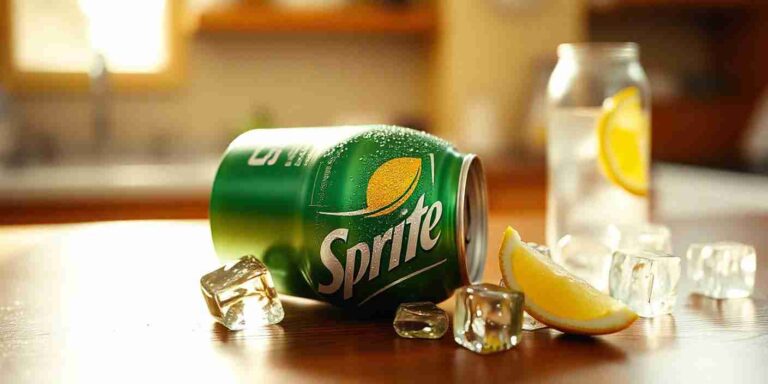Is Naked Juice Healthy? Find Out the Facts!
Is Naked Juice Healthy? Naked Juice isn’t as healthy as you might think. While it markets itself as a nutritious option packed with fruits and vegetables, many of its products contain high levels of sugar and calories.
If you’re looking for a quick boost or a convenient way to get your daily servings of produce, it’s important to dig deeper into what’s really inside those colorful bottles.
Understanding the nutritional content can help you make informed choices about your diet. You might be surprised to learn that some flavors have more sugar than a soda!
So before you grab a bottle on your next grocery run, let’s explore whether Naked Juice truly lives up to its health claims or if there are better options out there for you.
Key Takeaways
- High Sugar Content: Naked Juice contains significant amounts of sugar (53 grams per 15.2-ounce serving), comparable to sugary sodas, which can lead to health issues like weight gain and diabetes.
- Nutritional Benefits: Despite its high sugar levels, Naked Juice offers essential vitamins such as A, B, and C that support immune function and overall health.
- Lack of Fiber: The juicing process removes most of the fiber found in whole fruits and vegetables, potentially causing rapid spikes in blood sugar levels.
- Comparative Choices: Whole fruits provide more nutritional benefits with lower calories and higher fiber content compared to Naked Juice, making them a healthier option for meeting daily fruit intake.
- Processing Concerns: Some flavors may contain added sweeteners or preservatives, further increasing their sugar content while diminishing potential health benefits.
- Informed Decisions: Understanding the pros and cons of Naked Juice allows consumers to make better dietary choices tailored to their health goals.
Overview of Naked Juice
Naked Juice is a brand that specializes in juices and smoothies made from fruits and vegetables. Based in Monrovia, California, the brand operates under PAI Partners.
Naked Juice offers a variety of 100% fruit and vegetable juices, featuring popular flavors like strawberry banana, blue machine, green machine, and orange mango berry veggie.
What is Naked Juice?
Naked Juice produces smoothies using high-quality fruits and vegetable juices. The drinks undergo flash pasteurization to maintain freshness while ensuring safety.
The brand promotes itself as using only the best ingredients without added preservatives or artificial colors. Each product aims to deliver a nutritious option for consumers looking for healthy beverages.
Nutritional Information
A typical 15.2-ounce serving of Naked Juice provides the following nutritional values:
| Nutrient | Amount |
|---|---|
| Calories | 270 |
| Carbohydrates | 63 grams |
| Sugar | 53 grams |
| Fiber | 1.3 grams |
| Protein | 4 grams |
| Fat | 0 grams |
| Vitamin C | 50% of daily value |
| Vitamin A | 25% of daily value |
| Vitamin B2 | 25% of daily value |
| Vitamin B6 | 25% of daily value |
These details highlight key components that contribute to its appeal as a health-focused drink option. However, the high sugar content raises questions about how well it aligns with your dietary goals.
Health Benefits of Naked Juice
Naked Juice offers several health benefits, making it a popular choice for those seeking nutritious beverages. While it’s essential to consider its sugar content, you can find value in its vitamins and antioxidants.
Vitamins and Minerals
Naked Juice contains various vitamins and minerals that support your overall health. Each bottle provides important nutrients such as:
- Vitamin A: Supports eye health and immune function.
- Vitamin B: Essential for energy production and brain function.
- Vitamin C: Boosts the immune system and aids in collagen formation.
- Vitamin D: Promotes calcium absorption for strong bones.
Consuming these vitamins through Naked Juice can help you meet your daily nutritional needs.
Antioxidants
Moderate consumption of Naked Juice helps fulfill your daily antioxidant requirements. Antioxidants play a crucial role in fighting free radicals, which are linked to chronic diseases.
The fruits used in Naked Juice provide a rich source of these beneficial compounds, helping to reduce oxidative stress in your body.
Low Fiber Content
One downside is that Naked Juice lacks fiber due to the juicing process. Fiber is vital for digestion and helps regulate blood sugar levels.
Without sufficient fiber, sugars from the juice may spike more rapidly than they would if consumed with whole fruits or vegetables.
By understanding both the advantages and disadvantages of Naked Juice, you can make informed choices about incorporating it into your diet while being mindful of your overall sugar intake.
Potential Drawbacks of Naked Juice
Naked Juice may seem like a healthy option, but it has several drawbacks to consider.
Sugar Content
Naked Juice contains high levels of natural sugar, with a 15.2-ounce serving offering 53 grams of sugar. This amount is similar to the sugar in a can of soda.
Such high sugar intake can lead to problems, including spikes in blood sugar and weight gain. Regular consumption might increase your risk for chronic diseases like diabetes and heart disease.
Processing and Additives
The process used to make Naked Juice removes essential fiber from fruits and vegetables. Fiber is important for digestion and helps keep blood sugar levels steady.
Some flavors may also include added sweeteners or preservatives, which further raise the overall sugar content while reducing health benefits. Without fiber, you miss out on key advantages that whole fruits and vegetables provide.
Understanding these potential drawbacks allows you to make informed choices about whether to include Naked Juice in your diet while keeping an eye on your sugar intake.
Comparing Naked Juice with Other Beverages
Understanding how Naked Juice stacks up against other drink options helps you make better choices for your health. While marketed as a healthy beverage, it’s crucial to compare its nutritional content and effects on your body with other popular drinks.
Naked Juice vs. Whole Fruits
Choosing whole fruits over Naked Juice offers several benefits. Whole fruits contain natural sugars along with dietary fiber, which aids digestion and regulates blood sugar levels.
For example, an apple has about 95 calories, 25 grams of carbohydrates, and 19 grams of sugar, but also provides around 4 grams of fiber.
In contrast, a 15.2 oz serving of Naked Juice contains 270 calories, 63 grams of carbohydrates, and a significant 53 grams of sugar but only includes 1.3 grams of fiber due to the juicing process.
Additionally, whole fruits provide various vitamins and nutrients without the high-calorie count associated with juices, making them more filling and beneficial for long-term health goals.
Naked Juice vs. Other Smoothies
When comparing Naked Juice to other smoothies, consider their sugar content and ingredients carefully. Many commercial smoothies can have added sugars or sweeteners that raise their caloric value significantly.
Some homemade smoothie recipes may include yogurt or protein powder that adds nutrition while keeping sugar levels in check.
For instance, a homemade berry smoothie made from fresh berries (like strawberries or blueberries), Greek yogurt, and spinach may offer around 150-200 calories while providing higher fiber content compared to Naked Juice’s offerings.
While Naked Juice does contain some vitamins like vitamin C (providing 50% of the daily value) and is convenient for on-the-go consumption, its high sugar content makes it less favorable than consuming whole fruits or balanced smoothies made at home. Monitoring what you consume ensures you stay aligned with your health goals effectively.
Conclusion
Choosing Naked Juice requires careful consideration of its sugar content and nutritional value. While it offers certain vitamins and antioxidants it’s important to weigh these benefits against the potential downsides like high sugar levels and lack of fiber.
You might find that whole fruits or homemade smoothies provide a more balanced option for your health goals.
Always be mindful of how much you’re consuming to ensure you’re making choices that support your overall well-being.
By staying informed you can enjoy beverages in moderation without compromising your health.
Frequently Asked Questions
What is Naked Juice marketed as?
Naked Juice is marketed as a healthy beverage option, emphasizing its use of fruits and vegetables to provide essential vitamins and antioxidants.
Why should I be concerned about the sugar content in Naked Juice?
Despite its healthy image, Naked Juice contains high levels of natural sugars, which can lead to blood sugar spikes and weight gain if consumed in excess.
Does Naked Juice contain fiber?
No, the processing of Naked Juice removes essential fiber that helps with digestion and blood sugar regulation.
Are there added ingredients in some Naked Juice flavors?
Yes, some flavors may contain added sweeteners or preservatives, increasing their overall sugar content and diminishing health benefits.
How does Naked Juice compare to whole fruits?
Whole fruits offer more fiber and nutrients with lower sugar content compared to Naked Juice, making them a healthier choice for snacking.
Can homemade smoothies be a better alternative?
Yes, homemade smoothies allow for better control over ingredients, providing balanced nutrition without the high sugar levels found in store-bought juices like Naked Juice.
Should I monitor my consumption of Naked Juice?
Absolutely! It’s important to monitor your intake to ensure it aligns with your overall health goals while managing your daily sugar consumption.






